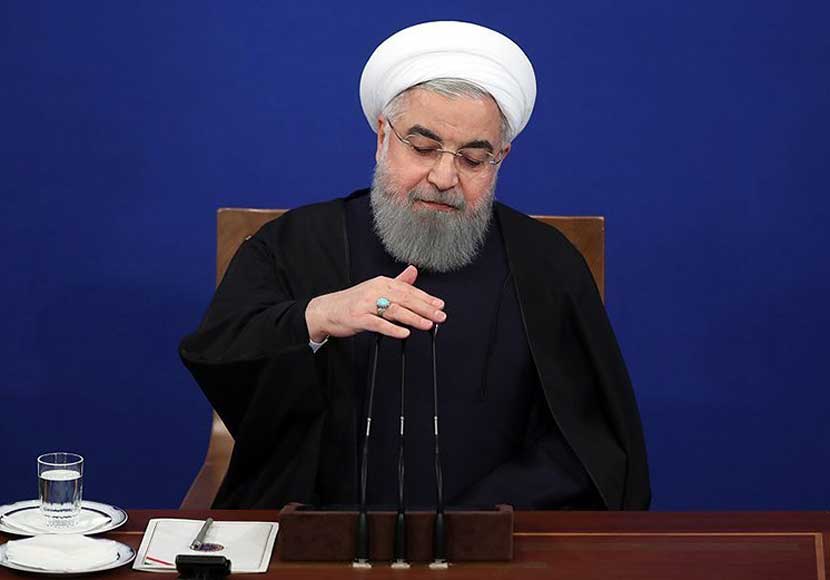February 14, 2018
In a speech marking the 39th anniversary of the Islamic Revolution on February 11, Iranian President Hassan Rouhani said that the referendum was the only way out of the current crisis. Rouhani was heckled by a group of young Basijis [volunteer militia] who shouted “liar, liar!”

Mr. Rouhani was referring to Article 59 of the Islamic Republic Constitution which states: “The legislative branch can call for a referendum to resolve severe social, political and economic crises. For the motion to be adopted, it would need two-thirds of the votes in the Majlis [Iranian Parliament.]”
A referendum is a legal tool for political leaders who wish to promote democracy in their countries. It could equally be used by despots and dictators to consolidate their hold over nations. The 1980 referendum successfully established the theocratic rule of the Islamic Republic of Iran. In the current climate, however, the regime is reluctant to hold a referendum, fearing the result would challenge its legitimacy.
Rouhani is not the first senior Iranian politician who has called for a referendum. In the wake of the nationwide civil unrest in summer of 2009, which followed the controversial re-election of President Mahmoud Ahmadinejad, former President Mohammad Khatami [1997-2005] said: “Holding a referendum is the only way to resolve the crisis.”
The only difference between now and eight years ago is that the reformists have lost popular support and credibility in recent years. It is unclear what Khatami meant by a referendum at the time. But it is safe to assume that he didn’t mean putting the legitimacy of the Islamic Republic regime to a popular vote.
Khatami said at the time: “I believe we can regain the public’s trust. We don’t know the exact number of people who have been arrested, jailed or killed. The law provides a path forward by allowing us to hold a referendum. We should ask people if they support the current trend. We would not be able to solve these problems if we insist on using the same wrong tactics. Needless to say, a non-partisan entity such as the Expediency Council whicu plays an advisory role to the Supreme Leader Ayatollah Ali Khamenei] should supervise the referendum. It is next to impossible to continue without the support of the Iranian people.”
Khatami’s comment made the headlines of many pro-reform newspapers in 2009. Some of those papers were subsequently shut down by the authorities including Sedaye Edalat. President Ahmadinejad and the Supreme Leader were blamed for the arrest, imprisonment, and death of protesters in 2009. But it is Hassan Rouhani’s government of “moderation, wisdom and hope” that brutalized protesters in December 2017.
Another major difference between the two events is that in the summer of 2009, protesters were challenging the outcome of the presidential election, whereas in the winter of 2017, people were calling for regime change. This time around, the protesters didn’t even mention the leaders of the pro-democracy Green Movement who emerged during the 2009 protests, namely Mehdi Karrubi,former Majlis Speaker from 1989 to 1992, currently under house arrest; Mir-Hossein Mousavi, Iranian Prime Minister from 198 to 1989, currently under house arrest; and Mohammad Khatami.
Other politicians including Akbar Hashemi Rafsanjani — Secretary of the Expediency Council until his death in January 2017– have at times implied that the referendum might be the best way to resolve major issues. But the regime will never agree to it. It fears that the public would overwhelmingly reject the Islamic Republic’s rule.
Even staunch supporters of the regime admit that, were a referendum to be held today, more than 75 percent of the population would vote “no” to the Islamic Republic system of government. There is a small minority of right-wing extremists who continue to believe that the Islamic Republic regime was divinely ordained and, therefore, will last forever.
Ezzatollah Zarghami, the head of the Islamic Republic of Iran Broadcasting (IRIB), recently said: “It is unwise and even in bad taste to propose a referendum, particularly after tens of millions proud Iranians marched around the country in support of the Islamic Republic. The idea is not even worth considering.”
The sentiment is echoed by the online Mashreq News, which is closely linked to the Islamic Revolutionary Guards Corps, IRGC: “The referendum will not solve the economic problems of the country. It will not improve people’s lives. It will endanger national security. It will only encourage the U.S. and its European allies to put more pressure on Iran regarding its missile program and regional activities.”
In an editorial entitled “Rouhani’s gift to the opposition,” Abdullah Gangi, the managing editor of the daily Javan — closely linked to the IRGC — argued: “It wasn’t a bad speech. Towards the end, however, Rouhani suddenly realized that he had not acknowledged the reformist intellectuals, the friendly media, and the BBC. He feared that they would criticize him for supporting the Islamic Republic and the conservatives. He suddenly forgot the Revolution and national unity, and instead offered a new solution to the problems that our country is wrestling with. He chose the 39th anniversary of the Islamic Revolution to highlight Article 59 of the Constitution. But he didn’t clarify what the people would be voting for in a referendum. Will it be for another nuclear deal? Will it be for the achievements of the Islamic Republic which he had highlighted in his speech a few minutes earlier?”








